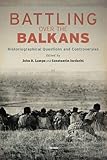Battling over the Balkans : Historiographical Questions and Controversies / ed. by Constantin Iordachi, John R. Lampe.
Material type: TextPublisher: Budapest ; New York : Central European University Press, [2022]Copyright date: ©2020Description: 1 online resource (342 p.)Content type:
TextPublisher: Budapest ; New York : Central European University Press, [2022]Copyright date: ©2020Description: 1 online resource (342 p.)Content type: - 9789633863268
- 949.6/04072 23
- DR34 .B38 2020
- DR34 .B38 2020
- online - DeGruyter
| Item type | Current library | Call number | URL | Status | Notes | Barcode | |
|---|---|---|---|---|---|---|---|
 eBook
eBook
|
Biblioteca "Angelicum" Pont. Univ. S.Tommaso d'Aquino Nuvola online | online - DeGruyter (Browse shelf(Opens below)) | Online access | Not for loan (Accesso limitato) | Accesso per gli utenti autorizzati / Access for authorized users | (dgr)9789633863268 |
Frontmatter -- Table of Contents -- Beyond Stereotypes: Recent Trends in the Historiography on the Balkans -- Chapter 1 The Ottoman Balkans and Nation-Building -- Chapter 2 Struggling with State-Building in Interwar Yugoslavia -- Chapter 3 Irregular Violence: Bandits, Guerillas, and Militias -- Chapter 4 European Influence and Reaction: Economics and Culture -- Chapter 5 The Jews and Other Minorities during World War II -- List of Contributors -- Index
restricted access online access with authorization star
http://purl.org/coar/access_right/c_16ec
The tumultuous history of the Balkans has been subject to a plethora of conflicting interpretations, both local and external. In an attempt to help overcome the stereotypes that still pervade Balkan history, Battling over the Balkans concentrates on a set of five principal controversies from the precommunist period with which the region’s history and historiography must contend: the pre-1914 Ottoman and Eastern Christian Orthodox legacies; the post-1918 struggles for state-building; the range of European economic and cultural influences across the interwar period, as opposed to diplomatic or political intervention; the role of violence and paramilitary forces in challenging the interwar political regimes in the region; and the fate of ethnic minorities into and after World War II, particularly Jews, Muslims and Roma. In an attempt to give a voice to eminent local authors, the chapters provide samples of new regional scholarship exploring these contested issues—most of them translated into English for the first time—and are prefaced with historiographical overviews addressing the state of the debate on these specific controversies. These translations help bridge the language barriers that often separate scholarly traditions within Southeast Europe, as well as scholars in Southeast Europe and English-speaking academia. This volume will enable readers to identify common patterns and influences that characterize the writing of history in the region, and will stimulate new transnational and comparative approaches to the history of the Balkans.
Mode of access: Internet via World Wide Web.
In English.
Description based on online resource; title from PDF title page (publisher's Web site, viewed 30. Aug 2022)


